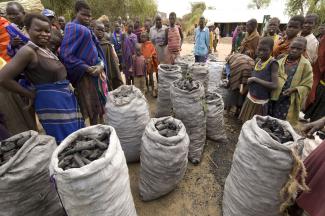Infrastructure
Destructive biomass demand

According to official data, biomass accounts for about 90 % of energy consumption. Firewood accounts for not quite 80 %. Charcoal and crop residues make up another 10 %. Electric power, by contrast, only accounts for 1.4 % of the national energy balance. The UN’s 7th Sustainable Development Goal (SDG) is to “ensure access to affordable, reliable, sustainable and modern energy to all”. Uganda still has some way to go.
Uganda’s rural families traditionally collect firewood and store it in the dry season. Typically, women and girls do this work. To an increasing extent, however, trees are cut down to get more firewood, and a considerable share is transported to urban markets and sold there.
Adding to the pressure, rural people want more arable land in view of population growth. Combined with the demand for firewood, this trend is causing considerable environmental damage and threatening the sustainability of forests. According to government data, the forested area decreased from almost 50,000 square kilometres to not quite 30,000 square kilometres in the two decades from 1990 to 2010. That trend has not been reversed. The government reckons that a further 900 square kilometres is cleared every year.
One consequence is that fuel wood is becoming scarce, so prices are rising, and yet more forest is cut down. Another consequence is that rural women and girls walk ever longer distances to collect wood. The adults spend less time doing agriculture or running their businesses, while many girls miss school (also see Dagmar Wolf in D+C/E+Z e-Paper 2020/04, Monitor section).
Most rural communities still lack access to electricity. Indoor fumes – whether from wood fires or kerosene stoves – are a health hazard, but many people have no choice. Even those who are linked to the grid (a bit more than 20 % of the population) often experience power failures. In spite of masses of people not being connected, electricity demand often exceeds supply.
Sometimes, midwives delivering babies must rely on the light of their mobile phones to do their work. Of course, insufficient power supply does not only hamper social services, but economic development as well (see Derrick Silima in D+C/E+Z e-Paper 2020/05, Focus section).
The government is promoting solar power. Indeed, solar panels serve to light homes or charge phones. Even people with low incomes can afford this kind of application. It is estimated that about 20 % of the households now rely on this technology.
In economic terms, the energy sector is of vital importance. Fuel taxes, the value added tax (VAT) on electric power and the export of electric power contribute considerably to government revenues. The power sector is attracting a large share of private investments. Energy is not only an important input for all kinds of industries, but the sector also provides employment. The government hopes that the recently discovered oil resources will improve Uganda’s outlook in the long term, but so far it has not made a difference.
Internationally, the oil price has recently been quite volatile (see Hans Dembowski in D+C/E+Z e-Paper 2020/05, Focus section). Low prices are good for Uganda, whereas price rises mean fast inflation. Uganda is a net importer of oil products, including diesel, petrol and kerosene. Government statistics showed that Ugandan fuel imports were expected to be worth $ 1.2 billion next year. Current price volatility means predictions of this kind may easily prove wrong, of course.
Environmentalists point out that fossil fuels must be phased out in view of the climate crisis, but it is obvious why the government hopes that domestic production will reduce the need to import oil products. In principle, Uganda is endowed with abundant energy resources. To achieve SDG 7, all opportunities must be grasped. The nation’s development depends on success. The scope for using renewables – especially solar energy – is huge, and it should be prioritised.
Gloria Laker Aciro Adiiki is a Ugandan journalist. She is also an activist involved in supporting refugees.
Twitter: @GloriaLaker







